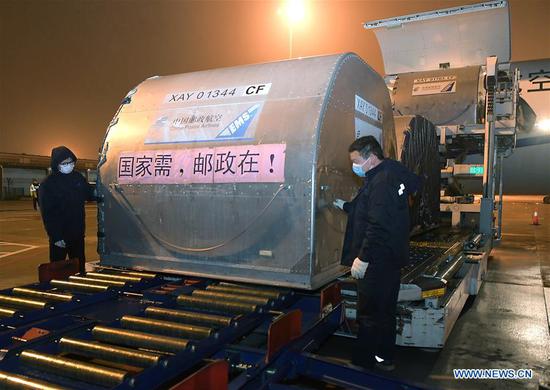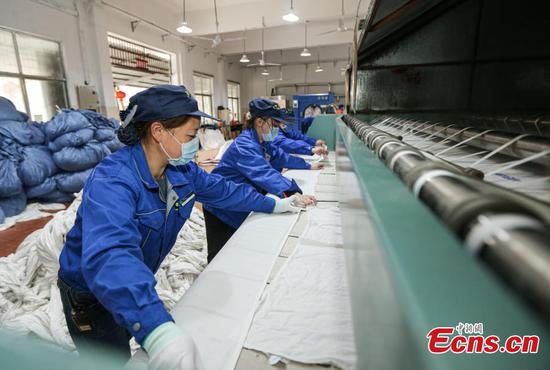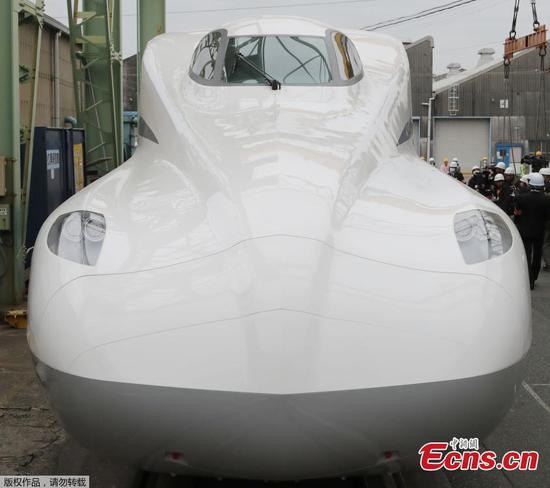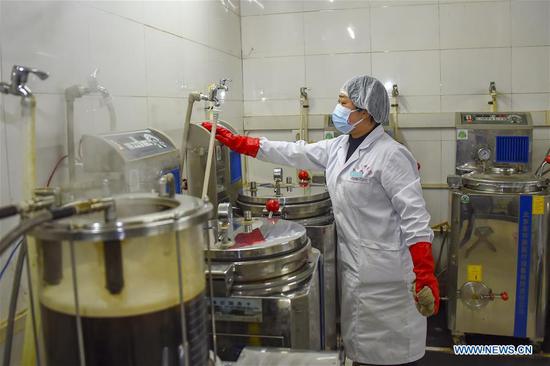While uncertainties over U.S. trade policy have declined somewhat in recent months, most tariffs that the President Donald Trump administration imposed over the past two years remain in place and continue weighing heavily on the U.S. economy, according to U.S. business and farm leaders.
A recent Congressional Budget Office (CBO) report notes that these new tariffs cover nearly 400 billion U.S. dollars of U.S. imports, with goods from China, imports of steel and aluminum, and goods from the European Union all in the mix, John Murphy, senior vice president for international policy at the U.S. Chamber of Commerce, wrote Monday in a blog post.
"Many of these tariffs are set at levels that are considered prohibitive -- that is, they shut out imported goods," Murphy said, adding these tariffs have damaged the parts of the U.S. economy that are most open to trade -- manufacturing and agriculture.
In fact, American manufacturers have fallen into recession, with the sector's output contracting by 1.3 percent in 2019, he said, adding "states such as Michigan, Wisconsin, and Pennsylvania saw net manufacturing job losses, and blue collar factory wages fell nationally last year."
Citing the result of "higher operating costs, reduced global competitiveness, and dampened investment", Murphy said tariffs continue to impose a heavy burden on many American businesses.
"At a time when the administration has been working to score more trade wins, leaving these tariffs in place will squeeze some of the very industries officials have sought to help," he said.
Non-residential fixed investment, a measure of corporate spending on structures and equipment, fell at an annual rate of 2.3 percent in the fourth quarter last year partly due to protracted trade tensions, according to revised data from the U.S. Commerce Department released Thursday. It marked the third straight quarterly decline, compared with a contraction of 1.5 percent previously estimated for the quarter.
"The uncertainty also dampened business sentiment and caused some firms to postpone planned investment. If it continues, the low level of investment will be troubling for the economy over the longer run," Loretta Mester, president of the Federal Reserve Bank of Cleveland, said Monday, warning that some long-lasting effects arising from trade tensions are likely.
"For example, some of our business contacts report that foreign firms have reoriented their supply chains away from U.S. firms, which means these exports may be permanently lost," Mester said at the annual economic policy conference held by the National Association for Business Economics.
At a congressional hearing on U.S.-China trade Wednesday, Richard Guebert, president of Illinois Farm Bureau, also said that farmers across the Midwest region have been hurt by the administration's trade war with major trading partners.
"Despite the passage of tax reform and its enhanced farm equipment expensing provisions, farmers are pretty much out of the market for new equipment. Tariffs on steel have increased the cost of grain storage. All of this has impacted the rural economy," Guebert told the House Ways and Means Committee, adding the number of farm bankruptcies is on the rise and farmers have less purchasing power.
"Testimony at yesterday's House Ways and Means Committee hearing reaffirmed what so many American businesses, farmers, consumers, and workers know to be true -- tariffs are hurting our economy, killing American jobs, and creating uncertainty that hinders investment and economic growth," Jonathan Gold, spokesperson for Americans for Free Trade, a coalition of more than 150 industry associations, said Thursday in a statement.
The spokesperson also mentioned that the Phase One trade deal with China represents "a step in the right direction," and that the administration "must go further and negotiate a Phase Two Deal that completely lifts all tariffs."
Tariffs imposed over the past two years are expected to reduce the level of real U.S. gross domestic product by roughly 0.5 percent and raise consumer prices by 0.5 percent in 2020, according to the CBO's forecast released in January. As a result, tariffs are also projected to reduce average real household income by 1,277 dollars in 2020.
Overall, Americans have paid an additional 50 billion dollars in tariffs since February 2018 through December 2019, according to data released by anti-tariff campaign group Tariffs Hurt the Heartland earlier this month.


















































